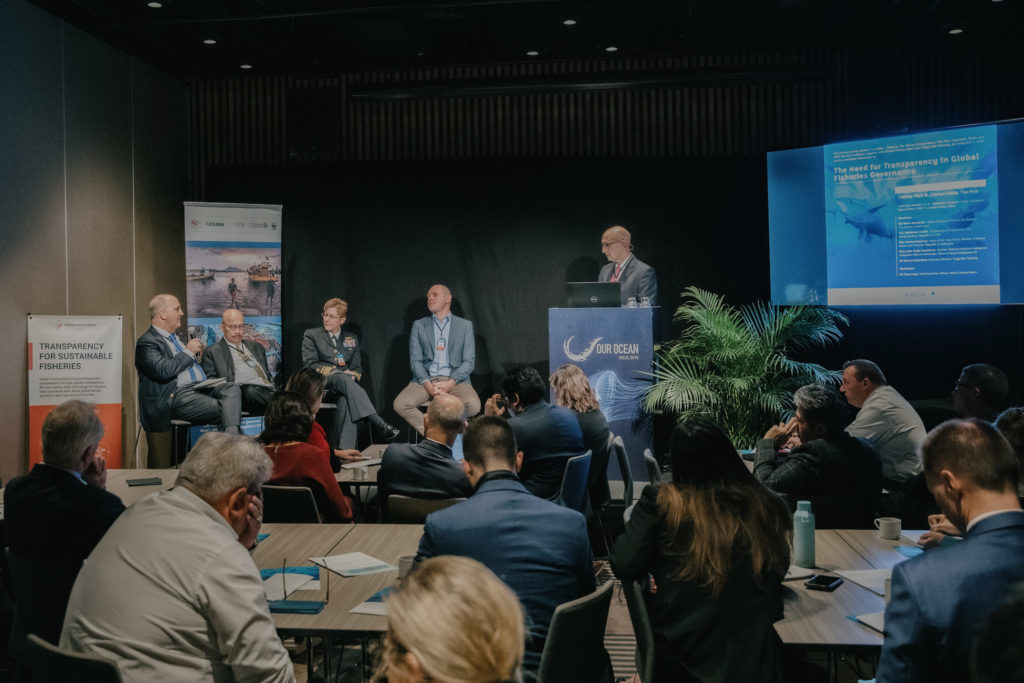At the 2019 Our Ocean Conference in Oslo, the EU IUU Coalition (The Environmental Justice Foundation, Oceana, The Nature Conservancy, The Pew Charitable Trusts and WWF), alongside Global Fishing Watch (GFW) and Trygg Mat Tracking (TMT), held a side event to discuss the importance of transparency in global fisheries governance. The event also marked the release of the EU IUU Coalition’s essential criteria for improving transparency and achieving good governance in fisheries. Moderated by Tony Long, CEO of GFW, the event provided an opportunity to explore means of improving transparency in fisheries so as to address the issue of Illegal, Unreported and Unregulated (IUU) fishing, whilst also identifying some of the barriers that exist to doing so.
During her introduction to the event, Maria Damanaki of The Nature Conservancy highlighted cooperation between all actors as an important means of increasing transparency and good governance, and several panellists showcased promising instances where regional and global collaborations had bolstered the ability of states to combat IUU fishing. Mas Achmad Santosa, head of the Indonesian Ministry of Marine Affairs and Fisheries IUU Task Force, spoke of the combined efforts of the Indonesian government, Interpol and amongst others the Australian, US and Korean fishing authorities in the apprehension of infamous IUU vessels STS-50 and Nika. It was also noted that Indonesia were the first country to make public their Vessel Monitoring System (VMS) data on the GFW interactive fisheries map, demonstrating how data sharing can lead to enhanced monitoring and facilitates cooperative surveillance and enforcement. A number of positive examples of regional collaborations were also discussed, such as the APEC roadmap to combat IUU fishing by 2020 and the sharing of licensing and other information between East and West African nations – illustrating the promise of multilateral data sharing and dialogue.
The importance of capacity building amongst nations within which IUU fishing is commonplace was a second theme that emerged throughout the event. Some panellists highlighted the fact that some of these states did not have the capacity to implement and enforce transparency measures such as mandatory IMO numbers or vessel tracking systems, making it considerably more difficult to effectively deter IUU fishing. Rear Admiral Kelly Aeschbach, Director of the National Maritime Intelligence Integration Office and Commander of the US Navy, also drew upon this theme, noting the importance of finding opportunities through funding, training or other exercises to broadly improve all areas of governance in nations that struggle to address IUU fishing, with these improved practices permeating the fisheries sector as a result.
The panel also provided interesting examples of how technological advances were increasingly being mobilised in efforts against IUU fishing. H.E. Waldemar Coutts, the Ambassador of Chile to Norway and Iceland, discussed an agreement made at the conference between the Chilean government and Norwegian firm KSAT to enhance the Punta Arenas monitoring station in Southern Chile, improving the capacity of the Chilean government to surveil their EEZ using high quality satellite imagery. Rear Admiral Kelly Aeschbach also spoke optimistically of the US Navy’s interest in pursuing new technologies, including satellite capabilities, maritime information sharing technology, artificial intelligence and machine learning.
IUU fishing comes at great ecological and financial cost. On the latter, H.E. Waldemar Coutts drove home the clear economic case for addressing IUU – stating that data suggests Chile loses $300 million through IUU fishing per year, on one fishery alone. With transparency at the core of addressing IUU, discussions at the event also explored some of the major barriers to making the fishing industry more transparent. The two main issues that emerged were the concealment of beneficial ownership, particularly amongst the world’s distant water fleets, and the transshipment of fish at sea. Duncan Copeland, Executive Director of TMT, stressed the unprecedented opaqueness of the fishing industry, and that our inability to uncover the genuine owners of fishing vessels and determine their compliance history is a major barrier to ending IUU fishing. This opaqueness is facilitated by the use of flags of convenience, shell companies and joint venture agreements, often making it near impossible to ascertain the true ownership of many fishing vessels. On why coastal states are not obtaining information on beneficial ownership, Mr Copeland suggested that they may prefer to have an agent within their country who they can deal with and hold responsible rather than have the beneficial owner as a point of contact, as many have experiences of vessels simply ‘disappearing’.
On transshipment, Tony Long suggested that the issue is the “Achilles heel” of addressing illegal fishing: “effectively a floating port at sea, it is not always very clear who is authorised to transship and where”. It was argued that differences in transshipment regulations between jurisdictions allow unscrupulous vessels to operate where less rigorous rules apply, which can facilitate the laundering of IUU caught fish. Mas Achmad Santosa also importantly highlighted that transshipment at sea undermines the effectiveness of the FAO Port State Measures Agreement (PSMA), the first binding international agreement that specifically targets IUU fishing.
Closing the event, Tony Long reflected upon Maria Damanaki’s three key terms for the event: cooperation, transparency and concrete action -“Cooperation is a high value thing in breaking down these barriers, transparency will help improve that cooperation and ultimately lead to those concrete actions”.

